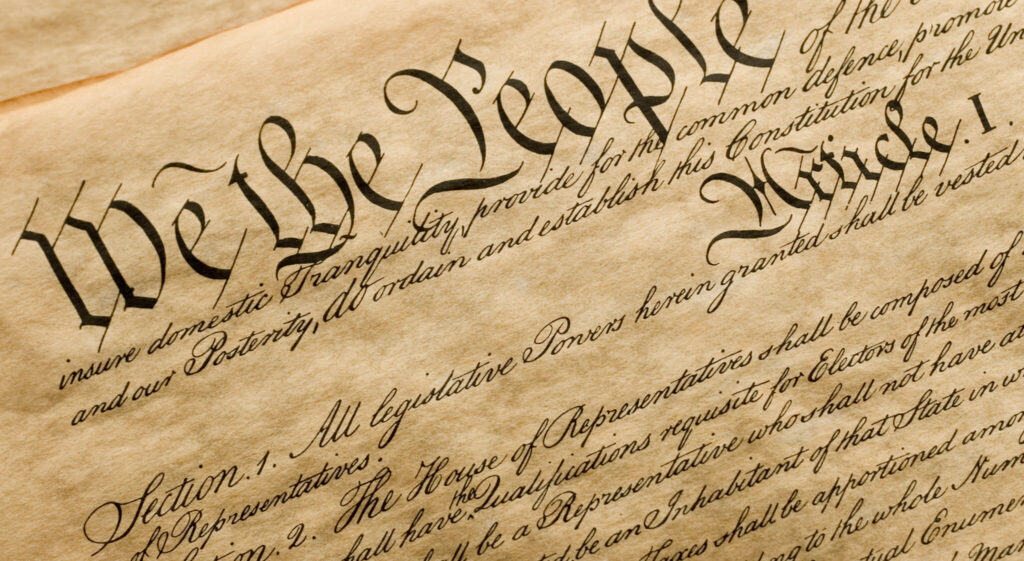
There’s a lot of talk nowadays about democracy. The threat of authoritarian government is rising, even in the good ole’ U.S. of A. Much can be said in favor of democracy, but it’s not perfect. While all people may have been created equal, in capabilities they clearly are not. It’s equality under the law that underpins democracy.
Democracy relies on the rule of law. Law is the DNA of the democratic body politic, outlasting whims of administrations and legislative change, thereby providing social and political stability. Financial corruption causes virus-like damage to the law’s DNA, however. As long as campaign funding and contributions remain central to American politics, we’ll never function as a healthy democracy. When the richest among us control the legislative agenda, the democratic process devolves into an influence peddling scheme. Equality under the law gets tossed; continuous fighting ensues.
Both the right and left are enthusiastic about fighting – fighting over who has the right to do what – but when fighting is the dominant metaphor about how to achieve cultural and social change, it spells trouble. The left fights for civil rights, women’s rights, and the right to a healthy environment. The right fights for property rights, taxpayer rights, assault gun ownership, and the rights of a week-old fetus. No wonder America is such a violent nation.
When adopted, the legal DNA of our constitution limited voting to white, male property owners. It was within this social class of the late 1700s we find that period’s most educated. In an age centuries before television, radio, cell phones and the Internet, widespread literacy and the reading of books influenced public opinion about what constitutes a good society. Not so today; it’s dubious that some members of Congress read any books at all. Sadly, America does not enjoy public service by the brightest and the best. As the situation degrades, government will be less able to maintain stability or sense of promise; tyranny then raises its ugly head.
People want to live feeling safe, that their lives have meaning and a viable future. They don’t want to be thrown into poverty if a breadwinner ends up in the hospital, be tossed from their home for no good reason, or see their children shot while attending school. If democracy fails them, people turn to other ways of organizing society but not necessarily ways that are free. It’s happening in many countries – Italy, Hungary, Venezuela, Argentina, and others. China has proven that under strict authoritarian control, a huge population can be economically productive.
Fundamentally, governments are instituted to control and restrain the worst of human nature, but authoritarian governments control and restrain by using the violence of our worst nature. So it is that such governments resort to torture, legal persecution, or even genocide. Compared to the likes of Hitler’s Germany, American democracy, imperfect as it is, looks pretty good; however, that’s an extreme standard of measure. The question before us is: what kind of democracy do we want?
Ignorant politicians are in positions of authority because the American public has grown ignorant. Our 21st century media is intent on propagandizing, not educating or informing. Having lost our common frames of reference, many citizens abandon politics altogether, leaving voting to highly motivated crazies; it’s why so many of our politicians are crazy.
The assumption by our founding fathers that voters would be literate and well educated was foundational to their faith in democracy. We are clearly not doing well on that score. Civics is barely taught anymore; how we can work together as people to create a fair and good society is a discussion that no longer happens in school, and rarely, I suspect, in many homes. And yet, this conversation is essential to viable democracy. If there is no solid foundation, democracy collapses.
The 2024 election is being promoted by both sides as determining the future of democracy. Each side sees the other as a threat to that future. I know where I stand. Do you?
Brilliant. And not just because I agree with you. The way forward starts at the local level, not just because that is where the consequences of governing are actually seen and felt, but because that is where the impact is most profound. What kind of government do I want? One that works for the best outcome for not just me, but for my community and for my heirs.